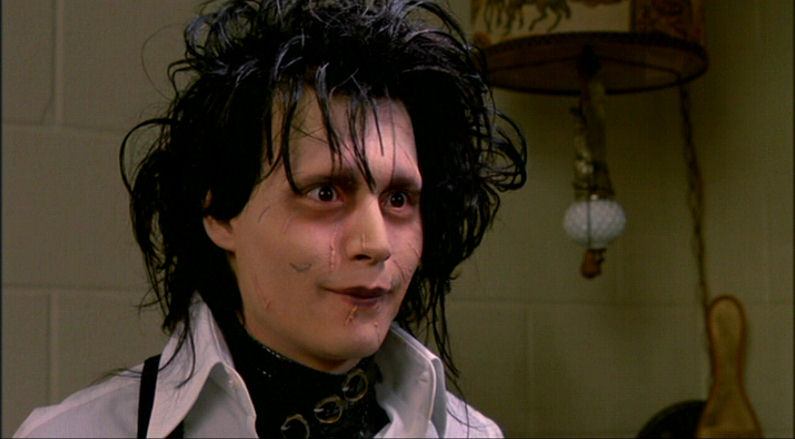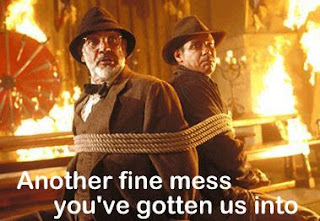Acting is a brutal art.
To accomplish a real act of drama, not just a light and frothy musical
scene, but deep sorrow and regret, requires something from one’s soul that must
be torn out. Bjork, the star of the 2000 film, Dancer in the Dark, said
that the role of acting in this film was so emotionally wrenching that she
would never act again. She also may have
given a hint that the director of extreme film, Lars Von Trier, could be the
cause of this. She had nothing good to
say about him after the filming, calling him “sexist.” Is it because he was demanding sacrifice more
than she could give for the film? Certainly
he is more demanding of his female characters than his male ones.
Sacrifice is never pretty.
Some demand our sacrifice, some compel us to sacrifice ourselves for
them. Most people don’t want anyone else
to sacrifice for themselves. They can
take care of themselves, take care of their own. Certainly Selma, the focus of the film,
wanted no help. Yes, she had a genetic
disease, a sight disorder that had just about made her blind. Her son has the same disorder. But she has a plan. She will work hard and save the money
necessary in order to get her son an operation so he can see, and end the curse
on her family. It turns out that the
cost was going to be much higher than she expected.
Selma loves musicals.
Although her life is focused on her son, her one real joy is music and
dance. Her friend, Jeff, wonders why
she would love musicals so much. “I don’t
suddenly break into song and dance.” “No,”
Selma replies, “no, you wouldn’t.”
But Selma does, in her mind. She can hear the rhythms of everyday life,
the beats of the factory, the pounding of a train, the sketching of an artist
and turns them into songs. She is the
star of her own musical. But like the
film, the songs aren’t rushed, nor do they have a tight melody. They linger in emotion, momentarily
hesitating and then rushing past the natural beats. They dance around, perhaps even fight
against the very rhythm that is their source and pulse.
So this film, with its documentary cinematography, musical
sensibility but ultimately brutal nature is almost unnatural, fighting against
the limits of our mind and demanding that we, too, sacrifice ourselves. It is no-holds-barred cinema. Not for the squeamish or overwrought. But it’s hyper-drama may be what some need to
retain hope. Yes, hope.
* * *
Spoilers below
Like the train, though, the songs move forward, as does the
film, pushing along. As Selma’s eyesight
fades, so the film becomes emotionally dark and Selma’s path toward her goal
becomes more difficult, even brutal. Despite the darkness that she can no longer
ignore or hide, she is determined to reach her goal, no matter what it costs,
no matter what she must sacrifice.
In the end, Selma is the scapegoat, the sacrificial lamb,
the one whose life must be laid down for the sins of others. She is the innocent one, the pure unblemished
offering. Through her is healing, through
her is mercy, through her the guilt is washed away.
Watch her. See how
she is kindly brutalized, but she responds to all with gracious kindness and
acts of mercy. See how she is there to
bring life and to heal life, to give precious gifts through her own veins. Look at the glorious victim, one moment unable
to stand, and the next joyfully accepting her fate! Glory to the precious redeemer, tied to the
beams and hung for our errors, the innocent for the guilty. All we like sheep have gone astray, we have
turned everyone to his own way, but the Lord hath laid on her the iniquity of
us all.
This is the greatest, truest passion of them all.
But this is not the last song. Death is not the finale. They do not know, but the last song is still
to be sung. For this is not the
end. Because she willingly poured
herself out to death, and she was numbered with the transgressors, she will be allotted with the great, she will
prosper and will be highly exalted.
This is the state of the poor. Selma works and does all she can, but nothing
comes of it. Because of her kind nature,
and due to her human weakness, more is demanded of her than she can give. She gives all, but it is not enough, there is
always someone… more than someone… who demands more than she can give. It is the way of the world. Those who are kind and have little, more is
demanded of them. More than they can
give. Eventually, broken and bruised,
brutalized and beaten, they surrender all for the sake of those they love.
But this is not the end of the
story. There is still hope, there is
still a future. While the poor do not
see justice in their lives, it exists in the future. They will be praised for their
sacrifice. The slaves, the falsely
accused, the abused, the oppressed, the outcast—they will have their day. This is not the last song. We can just hear glimpses of the melody. We know the last song is coming. We just need to wait.
This last song is not for the pillars of society, the powerful, the respected, the comfortable. They have had their chance, their song. Those who see the penultimate song and call it the finale. If they partake in the last song at all, it will be in a supporting role, for finally the weak who supported these pillars on their backs will have their due.
“It will be a day like this one
when the sky falls down and the hungry and poor and the wounded are found.”
-Switchfoot


_02.jpg)




































